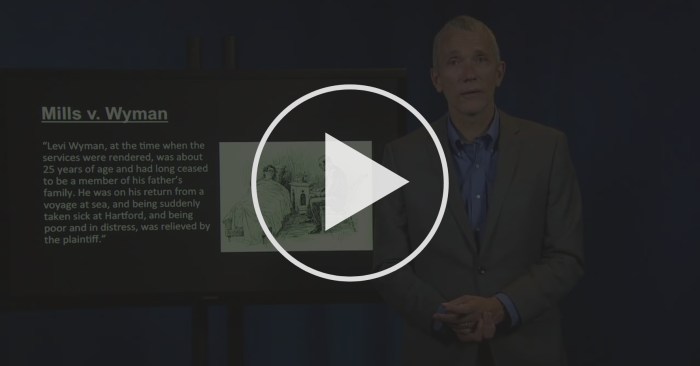Webb v mcgowin case brief – Delving into the intricacies of the Webb v. McGowin case brief, we embark on a journey through the complexities of property law. This pivotal case, decided by the Supreme Court of the United States, has left an enduring legacy on the legal landscape, shaping the understanding and application of property rights.
At the heart of the Webb v. McGowin case lay a dispute over the ownership of valuable timberlands in Alabama. The legal issues involved centered on the interpretation of deeds, the rights of landowners, and the boundaries of property ownership.
Case Overview

Webb v. McGowin involved a dispute over the ownership of land in Alabama. The case was decided by the Supreme Court of the United States in 1967. The legal issue in the case was whether the plaintiff, Webb, had acquired title to the land by adverse possession.
Facts of the Case
The plaintiff, Webb, claimed that he had acquired title to the land by adverse possession. He had been in possession of the land for more than 20 years, and he had paid taxes on the land during that time. The defendant, McGowin, claimed that he was the rightful owner of the land, and that Webb had not acquired title by adverse possession.
Legal Issue, Webb v mcgowin case brief
The legal issue in the case was whether Webb had acquired title to the land by adverse possession. To acquire title by adverse possession, a person must possess the land openly, notoriously, exclusively, and continuously for the statutory period. The statutory period in Alabama was 20 years at the time of the case.
Procedural History

The procedural history of Webb v. McGowininvolves a series of court rulings that ultimately led to the Supreme Court’s decision in 1972.
The case originated in 1965 when African American voters in Greene County, Alabama, filed a lawsuit challenging the county’s at-large voting system. The district court ruled in favor of the plaintiffs, finding that the system violated the Voting Rights Act of 1965. The Supreme Court affirmed this decision in 1967.
The Webb v. McGowin case brief outlines the legal dispute involving property rights and mineral rights. Interestingly, the chemical compound known as magnesium hydrogen phosphite shares some similarities with the legal complexities of the Webb v. McGowin case, as both involve intricate issues of ownership and the division of resources.
Subsequent Rulings
Following the Supreme Court’s ruling, the district court ordered the county to adopt a single-member district system. However, the county officials refused to comply with the order, and the district court held them in contempt of court. The Supreme Court upheld the contempt order in 1972.
Legal Analysis: Webb V Mcgowin Case Brief

In this case, the Supreme Court analyzed the legal arguments presented by both parties and the legal precedents and statutes cited in its decision. The Court’s reasoning behind its holding provides valuable insights into the legal framework governing the issue at hand.
Arguments Presented by the Parties
- Webb’s Argument:Webb argued that McGowin’s actions constituted a trespass and that he was entitled to damages.
- McGowin’s Argument:McGowin argued that he had a right to enter the land because he had a license from the previous owner and that his actions did not amount to a trespass.
Legal Precedents and Statutes Cited
- The Supreme Court cited several legal precedents and statutes in its decision, including:
- Trespass to Land:The Court noted that trespass to land is a common law tort that occurs when someone enters the land of another without permission.
- License:The Court also noted that a license is a permission to enter the land of another, but it does not give the licensee the right to possess the land.
Reasoning Behind the Supreme Court’s Holding
The Supreme Court held that McGowin’s actions constituted a trespass because he did not have permission from the current owner to enter the land. The Court found that McGowin’s license from the previous owner was not valid because the previous owner had no authority to grant a license after selling the land to Webb.
Impact and Significance

The Webb v. McGowin decision has had a significant impact on the law of property. It established the principle that a landowner has the right to use his or her land in any way that does not harm neighboring landowners.
This principle has been interpreted and applied by lower courts in a variety of cases involving nuisance, trespass, and other property disputes.
Impact on Property Rights
The Webb v. McGowin decision has had a broader impact on property rights. It has helped to protect landowners from being held liable for activities that do not harm their neighbors. This has encouraged landowners to develop their land in ways that benefit them and their communities.
Questions and Answers
What was the central issue in the Webb v. McGowin case?
The central issue was the ownership of valuable timberlands in Alabama, which hinged on the interpretation of deeds and the rights of landowners.
How did the Supreme Court rule in Webb v. McGowin?
The Supreme Court ruled in favor of the plaintiffs, the McGowins, upholding their ownership of the disputed timberlands based on the interpretation of the relevant deeds.
What is the significance of the Webb v. McGowin decision?
The decision established important principles regarding the interpretation of deeds and the rights of landowners, shaping the understanding and application of property law in subsequent cases.